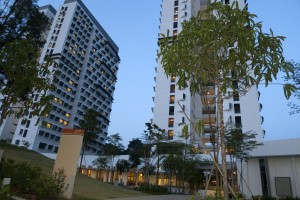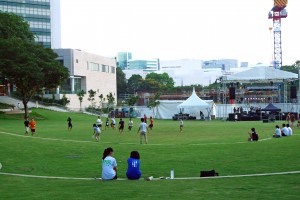An unfortunate incident occurred on Saturday, 1 Oct 2011. 725 students were scheduled to sit for a Managerial Economics (offered by the NUS Business School) mid-semester test, which had to be cancelled at the last minute. Shortly before the test was due to start, the lecturer found that he had less than 500 scripts on hand. After considering various options, he decided to call off the test. Within moments, comments were tweeted and disseminated instantaneously. The mainstream media fielded many reports too. There was much interest, speculation and commotion. Later, our preliminary investigations confirmed that a human error had occurred. A staff was tasked to print 750 scripts, but had instead printed less than 500 copies. We must and will take steps to avert a future occurrence.
The brouhaha and outbursts witnessed are perhaps in part a manifestation of how intensely our students and society view examinations. The Singapore educational system prides itself as a meritocratic one. Somehow, the notion of meritocracy has been deeply entwined with examinations. I would like to take this opportunity to share about the evolving role of examinations at the NUS, and how we should develop a healthier and more balanced perspective towards examinations.
When I was an undergraduate at the NUS some 25 years ago, ‘exams’ was a terrifying word. Then, each course was taught over two semesters, and a typical load was to read 6 courses. Each course entailed 5 hours of lectures and one hour of tutorial every week, excluding laboratory time! At the end of the second semester, we had to sit for a three-hour exam for each course. Exams determined everything – it was a ‘make it, or break it’ system (or some would say, ‘do or die’). Should you fail an exam, you can attempt a Re-exam (the proper term was Supplementary Examination). If you’re not able to clear any of the ‘Re’s, there were no ifs and buts about it – you’ll have to repeat the entire year.
The release of exam results was even more interesting. NUS students nowadays can go online to view their results, or opt to receive SMS notifications. But back in those days, the Registrar would print out the matriculation numbers and corresponding grades of all candidates; these would be posted on a notice board near the Registrar’s Office. Results were usually released at around 8 am and many anxious students will be congregating there hours before.
Imagine the fear, grip and trepidation that exams evoked.
But, let us examine objectively – are examinations necessarily evil or are they a necessary evil? Some students feel that exams are intrinsically linked to a CAP system and with a CAP system in place, exams will always take centre stage at the NUS. This is not so. My view is that exams certainly do provide a means to measure learning outcomes; they are the traditional, tried and tested assessment medium. There are however, also other alternative methods that are effective in measuring and assessing learning outcomes; many of these methods are notably more labour-intensive to employ.
Should we then embrace or eschew exams? Exams are not intrinsically bad, but we should refrain from using them solely and deterministically. Yet, a system with no exams may not be ideal, as exams do provide a sound learning and testing platform for certain subjects. The sensible and constructive way forward, I think, is to adopt a balanced approach.
As such, the NUS has over the years been moving away from a rigid exams-driven system. We have progressively decreased the weightage of final exams, and to place more emphasis on continual assessment instead. Even with continual assessment, we hope that our lecturers will introduce innovative methods of continual assessments, beyond the traditional tests. Many modules now have project work as an integral component. Overall, the NUS system is today a more flexible and forgiving one. We no longer have Supplementary Examinations. If a student fails a module, he or she is not ‘retained’, but is given the opportunity to retake the module, without having to repeat the entire set of modules taken in the previous semester or year.
Ultimately, our aim is to enable and empower students to maximize their learning opportunities at the NUS. We have since allowed students to declare S/U options after the release of results – the motivation behind this move is to encourage students to try out challenging modules and not be deterred by possible CAP implications. Students know this S/U option very well, but many see this as an opportunity to ‘even out heavy course loads’. Many students would like the S/U option to be expanded beyond 3 modules. We may consider this and I will take this discussion further in a future post.
There is a place for exams, but let’s put exams in its proper place.


